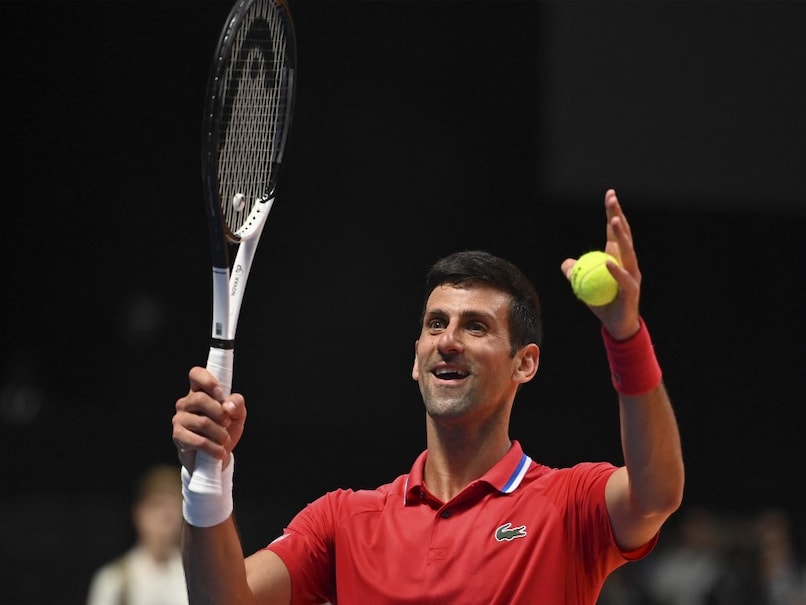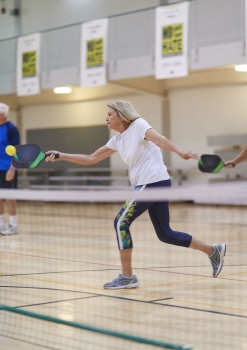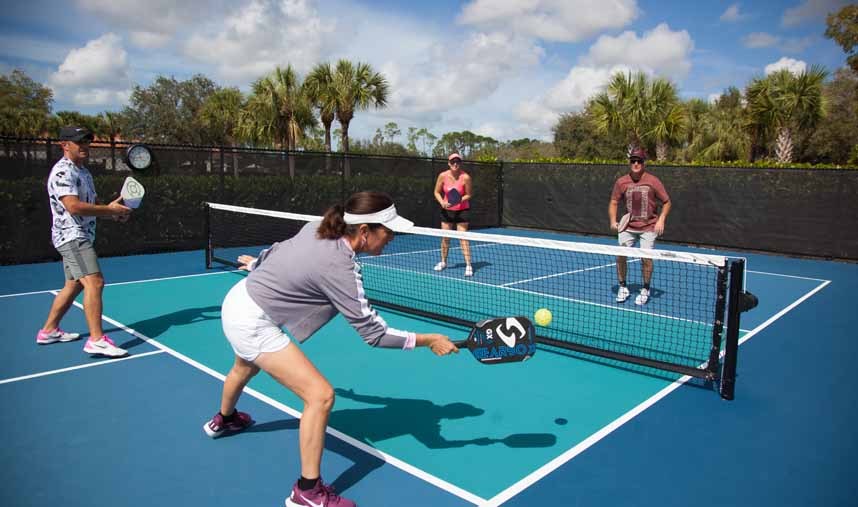
Pickleball drills are a great way to improve your game. These drills can improve your hand-eye coordination as well as muscle memory. These are critical in a game that requires agility and speed. There are many pickleball drills available. You can choose from a variety of drills that focus on basic skills or more advanced ones. However, all of these drills will make you a better player.
Serve is the first pickleball drill that you should attempt. It is essential to master how to hit a ball with a paddle. Once you've perfected your technique you will be able to increase your speed and improve your chances of hitting your ball. This is one of the most difficult things to master, so you will need to do it repeatedly. This can be done by working with a partner, or simply by you.
The side-stepping drill is another helpful drill. You will need to shuffle cones and keep your eyes fixed on a goal. You can change sides as fast as you like. You will soon be able recognize when it is best to drive a ball.

You should play at different areas of the court to get the best out of the drill. To practice different styles of play, you should play against different opponents. Practice serving from different areas on the court, including the back third of the service box.
For an easier version, you can hit the ball from the top of the paddle and let it bounce. To improve your pickleball skill, you need to practice volleys. Volleys are an important shot in pickleball. After learning how to volley, it's possible to move on to more complicated drills.
Another great pickleball drill is to practice juggling. This can be done with three balls or beanbags. Juggling can be a fun way to test your hand eye coordination and your lateral movements. Do not forget to practice other pickleball drills, which are more difficult while you are juggling.
Advanced selfie ball bounce drills are a great way to test your reaction times. This is especially useful if you are a beginner or if you are just learning the basics of pickleball. It can be used as a warm-up before a match.

Additionally to practicing drills each day, it is also important to make time for practice. Three months of competitive play is a good goal. This will allow you to see improvement in your game. Additionally, you will notice an increase in accuracy and hand-eye coordination. It is crucial to find a qualified instructor to help you improve your game. Remember to enjoy the sport and to practice it!
Last but not least, you need to choose a pickleball drill that is meaningful for you. It should be a challenge that you can handle and make you improve your game.
FAQ
Does exercise cause me to gain weight?
Not at all. Actually, exercising can help you to maintain your current weight. Training regularly can help you build muscles, increase your metabolism, and burn more calories. This will mean that your body won't store as many calories.
What is the importance of good nutrition?
Our health and well-being depends on our nutrition. Healthy diets include whole grains, fruits and vegetables as well as lean protein and dairy. Being active and eating healthy foods can help us be more fit, which results in better overall health.
How many hours of sleep should I get every night?
The recommended sleep hours vary based on gender, age and individual needs. Most adults require between 7 and 9 hours of sleep each night. Children and teens typically need between 7 and 9 hours of sleep each night. However, this number drops as they get older.
Are there any exercises I should not do?
You should always consult with your doctor before starting any new workout routine. Some people are unable to exercise due to injuries. Some activities also require special equipment. For example, swimming requires a swimsuit and pool access.
What effects does caffeine have on my sleep patterns?
Caffeine affects how long it takes you to fall asleep and how soundly you sleep. Caffeine makes falling asleep easy by causing drowsiness. But caffeine keeps you awake longer, making it harder to fall asleep again. Instead of drinking coffee or energy drinks just before bed, you might consider having them in the evening.
Statistics
- One study showed that adults who watch more than 4 hours of television daily had an 80% higher risk of death from cardiovascular disease. (heart.org)
- Adolescent girls were less active than adolescent boys, with 85% vs. 78% not meeting WHO recommendations of at least 60 minutes of moderate to vigorous intensity physical activity per day. (who.int)
- According to the Centers for Disease Control and Prevention, chronic diseases cause 7 out of 10 deaths in the U.S., and treating chronic diseases accounts for 86% of U.S. healthcare costs. (mana.md)
- Physical activity confers the following maternal and fetal health benefits: a decreased risk of pre-eclampsia, gestational hypertension, gestational diabetes (for example, 30% reduction in risk) (who.int)
External Links
How To
How to Burn Belly Fats Faster
Belly Fat is usually seen as a problem when we want to lose weight. It's actually a good thing, in fact. It is the fat in your stomach that protects your organs. So let's see how to burn belly fat fast.
The main factors that lead to body fat storage are stress and lack exercise. Because stress stimulates the release of cortisol hormone, it makes us hungry all the time. Cortisol raises insulin levels. The insulin then stores extra calories as fat. A lack of sleep leads to adrenaline being released into the system which causes an increased appetite. These extra calories are broken down through exercise.
There are many ways to reduce belly fat. You can try any one of them depending upon your budget. Here are some quick tips to get rid of belly weight.
-
Reduce the amount of food you eat. Don't eat three large meals at once. This will result in fewer calories.
-
Make sure you drink plenty of water. Water flushes out toxins in your body and helps you stay hydrated. Drinking water prior to every meal will ensure that you are satisfied for longer periods of time and won't eat too much.
-
Avoid unhealthy snacks. If you're looking for quick fixes, snack foods like chips, cookies, candies, etc. These tempting snacks might look appealing. But avoid these fattening treats as they contain lots of empty calories and too much sugar. Choose healthy alternatives like fruits and vegetables, nuts, seeds, whole grains, and seeds.
-
Strength training should be done at least three times per week. Strength training builds muscle mass which burns more calories even while resting. Strengthening your bones, muscles as well ligaments, joints, tendons, heart and lungs.
-
Walk or stretch regularly. Stretching increases flexibility and mobility. It also reduces back pain. Walking can help you burn calories.
-
Reduce alcohol intake. Reduce alcohol intake. Alcohol is a waste of calories and has no nutritional value.
-
Lose weight gradually. To lose weight, the first step is to determine what your current weight. Add 5%-10% of your total bodyweight to calculate your ideal size. Once you have calculated your target weight, start reducing calorie consumption by 500-1000 calories daily until you reach your goal.
-
Avoid processed foods. These foods are high in salt, sugar, preservatives, and other harmful ingredients. While processed foods can be convenient, they don't offer enough nutrients to ensure your health.
-
Don't skip breakfast! Breakfast is good for your concentration, memory, and energy. Breakfast should include protein (like eggs), fiber (like oats), and complex carbohydrates (like oatmeal).
-
Have regular bowel movements. Gas and bloating can result from irregular bowel movements. This can be prevented by drinking plenty of water and increasing fiber intake.